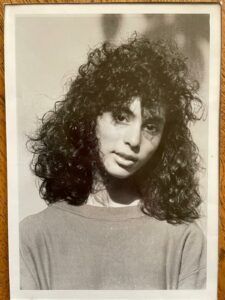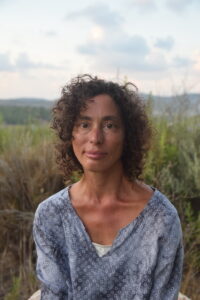by Haviva Ner-David
The last line of my author bio reads: “Rabbi Haviva Ner-David lives with a degenerative genetic form of muscular dystrophy called FSHD, which has been one of her greatest teachers.”

I was born in 1969 with the gene for FSHD, although back then the gene had not been discovered yet. I already had symptoms in my face, but no one in my family had FSHD. We had never heard of it, so it took until I could no longer lift my arms at age sixteen for me to get a clinical diagnosis – after tens of doctor visits and tests.
As many of you know, and some of you can try to imagine, being diagnosed with a degenerative genetic disease for which there is no cure at such an emotionally vulnerable age is traumatic. It was this pivotal event in my life that set me on a spiritual path, seeking meaning and purpose in a universe that suddenly seemed extremely chaotic and cruel. For years I sought what I was looking for in religion and spiritual paths, which is not in itself problematic, except that I was bypassing the root of my spiritual longing, my sacred wound, my clinging to the notion that life should be fair.
Until I began studying to become certified as a spiritual companion. As part of this course of study, I was required to meet regularly with a spiritual companion, in addition to being introduced to a range of modalities to use in this work, including dreamwork, inner child work, nature soul work, and Soulcollage.
My latest (and fourth) book (and third memoir), Dreaming Against the Current: A Rabbi’s Soul Journey, tells the story of this journey to heal my own sacred wounds so that I could help others heal theirs. Not surprisingly, this included some challenging yet cathartic work around my FSHD. Here is the conversation I imagined having with myself at age 16:
“ARE YOU READY to talk now?” I ask my sixteen-year-old self, who has just been diagnosed with FSHD.
“I am here, aren’t I?” she quips.
“Is that a yes?”
“I guess so.”
My adult self has experience with teenagers. “I see you are a bit hesitant to talk. Should I come back another time?”
“No. We may as well talk if we’re both here.”
“Ok. Good. Thank you for making time for me. So, what are you feeling now?”
As if I had been waiting all these years for someone to ask me that question, my emotions pour out. “I am scared and confused. Robbed of my childhood. I suddenly feel different from everyone else. Or maybe it’s more like I always felt different, but now it’s confirmed. Now I know why.”
“In what way are you different?”
“I look different. I feel different. And I don’t know what kind of future I will have. I feel an urgency to do it all before it’s too late. I have so much I want to accomplish. Will I be able to do all I wanted to do with my life? Will I fulfill my dreams?”
“Yes, you will. It might be challenging, but you will. Don’t worry. I am your adult self. I can tell you that you will. What else is upsetting you?”
“I feel disappointed. Let down. I am angry.”
“At whom?” my adult self asks my teenage self.
“At life, I guess. At God.”
“That’s only natural. You’ve received shocking news. Your life suddenly looks totally different than it did yesterday.”
“ Yes. Everything is uncertain now. I feel helpless too. Out of control.”
From the place of a middle-aged woman, I suddenly feel wise. I tell my sixteen- year-old self: “At times like this we are reminded of the lack of control we always have in our lives. It is true for everyone, always. But you are feeling it now especially intensely. Or perhaps you did not even realize it until now. You are still so young.”
“I am only sixteen years old,” my teenage self replies. “My life is just beginning. And now it feels like I can already see the end, and the suffering I will have to experience along the way. I am scared.”
“What are you afraid of?” my adult self asks.
“Of what will be and what won’t be. Who will love me like this?”
I think of Jacob. My children. “Oh, you will be loved. Don’t worry about that.”
“I am not sure I can believe someone will love me. I am not even sure I can love myself now. Will I be deformed? Unattractive? Frightening?”
“Beauty is in the eyes of the beholder.” I hear Jacob in my head when I say this.
“Don’t feed me clichés. I want truth!”
I smile to myself. “That is the truth. Your beauty will be appreciated by those who will recognize it. Trust me on that one.”
“I am having a hard time trusting right now.”
“That’s understandable. What can I do to help you now? To restore your trust.”
“I am not sure what I need. I want to be taken care of. I can’t do it all. I want someone to tell me I don’t have to do it all. I want special treatment because I am sick. Let me be sick. But at the same time, I don’t want to be different. I don’t want people to treat me differently. I am not sure what I want, what I need right now.”
“That’s fine. You don’t have to know.”
“Maybe I just want to cry. Life is cruel. I want to be able to say that. Life is cruel. I am in pain. I am suffering. I want to be able to cry for myself. Why can’t I cry for myself ?”
“You can. You are allowed to cry. Go ahead. Cry. I am here. You can cry on me. I too have suffered. We all suffer. It’s part of life. You are not alone. Just do your best. That’s all you can do.”
“So, I’ll cry, and then what? What good will that do?”

“When you finish crying, I will take your hand and we will face this together. We will do our best with the canvas we were given to draw our unique life story. There will be challenges along the way, but it will be a beautiful life. Not without suffering, but rich and meaningful, and you will give to the world all your unique gifts, even with this illness. In some ways, even because of this illness. You can trust me. You’ll see. I will take care of you.”
“You will?”
“Yes, I will. But for now, just cry. Feel your pain. It is real, and it is true. And it is not shameful. I will always love you, even with your pain, and even with your degenerating body. You are as beautiful and unique as your life promises to be. So just cry, my child, and let me hold you. Entrust yourself to me fully. Let go into my embrace.”
And then the tears of thirty-two years are finally released.
Dreaming Against the Current, by Haviva Ner-David, is available at Amazon, Barnes and Noble, Bookshop, and Book Depository.


Your writing is painfully exquisite.I have MS and identify with you.I feel alone despite being with family.I have completed my memoir “Living at the Mercy of the Moment with MS” which is being edited.How can I purchase your book?Thank you for your magnificent contribution and presence in the world.
Gratefully,
Jeannette Elsner
We’re glad you enjoyed this excerpt. Links to purchase Haviva’s book are at the foot of the blog post.
This is one of the most beautiful excerpts I have ever read and echoes what is in my head and heart. Thank you Haviva.
As a fellow FSHer, dx at 7 in a chair at 13 I read this like many other autobiography stories of those with different types of MD and wonder was I fortunate or did I miss out on finding myself? My mom told me from six years old when I started falling down not to see what I may not be able to do, which at that point was not too much. I took dancing for eight years and in advanced classes for my age until I was 12 1/2. Rode a bike early, played on a softball team when I could barely run. When I went in the chair I was told ‘now you’ll just do things sitting’ and I did. Lots of things. Where I’m heading is I never was told nor thought I could not do anything I ever wanted to. Did that make me conceited? Or perhaps privileged/spoiled because I never had to work for anything?
I am sorry others did not have the same feelings growing up and it saddens my soul they may have suffered. One day I’d love to have a big group discussion with individuals comparing how they were raised and if in fact it goes back to parenting styles or something else. You know the ol nature v nurture debate.
Did not mean to hijack your story. It was great. I am glad you are living your best life!!
Haviva’s story AND the thoughtful comments are appreciate also the work of June Kinoshita and the FSH society staff who tirelessly work to keep us connected while forging ahead looking for a treatment/cure.
I am well past adolescence and my diagnosis. My life has been exciting, fulfilling and meaningful. It has been a VERY different life than expected but I often talk of the “gifts of my disability“.… There are many… some of which were alluded to in Haviva’s story… perspective, appreciation of life’s small gifts, keen sense of observation and empathy, the desire to do things in the moment as there may not be another moment…
And yes parents either with or without FSH…never, never underestimate the power you have as a role model for positive, “can do”, determined thinking.